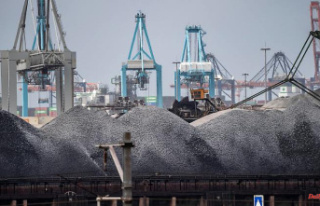Ukraine is getting a reprieve: a two-year delay on nearly $20 billion in bond payments. Prime Minister Schmyhal is satisfied. This will help "to strengthen the sustainability of the Ukrainian economy and improve the clout of our army".
Foreign creditors have given Ukraine a two-year grace period for nearly $20 billion in pending bond payments. This allows the war-torn country to avoid default, as a document shows. Accordingly, the holders of around 75 percent of the outstanding bonds agreed to the proposal from Kyiv.
"Ukraine will save nearly $6 billion in payments," said Prime Minister Denys Shmyhal. "These funds will help us maintain macro-financial stability, strengthen the sustainability of the Ukrainian economy and improve the effectiveness of our army."
According to experts, this will give the country some breathing space. "The two-year debt freeze makes sense because even if the war ends soon, Ukraine's situation will not improve overnight," said Tellimer's chief economist Stuart Culverhouse. "The creditors were even surprised that the country initially decided to service the bonds until now."
Asset managers Blackrock, Fidelity International, Amia Capital and Gemsstock are among the largest holders of Ukrainian bonds. Their market value has fallen by more than 80 percent since the end of 2021 when Russian troops began to deploy on the country's borders.
This is the second success in Ukraine's debt restructuring this week. The government in Kyiv had already received the green light from lenders on Tuesday to change the warrants linked to economic development. In July, the government presented a proposal to change the terms of the $2.6 billion outstanding paper. This is a security that triggers payments depending on economic growth. According to the information, 93 percent of the owners took part in the vote. About 91 percent gave their approval for the planned change.
Since the beginning of the Russian attack on February 24, Ukraine has been in a severe economic crisis. The World Bank assumes that the gross domestic product (GDP) will collapse by more than 45 percent this year. Bilateral creditors such as the USA, Great Britain and Japan have also spoken out in favor of deferring debt repayments. A group of governments in the so-called Paris Club agreed to suspend payments until the end of 2023. "This will improve foreign currency cash flow for Ukraine," said Carlos de Sousa, portfolio manager at wealth manager Vontobel Asset Management. "But this alone is unlikely to be enough to stabilize foreign exchange reserves."
Ukraine's international reserves have shrunk from $28.1 billion to $22.4 billion since March. According to De Sousa, a comprehensive debt restructuring is expected after the debt freeze because it is "unlikely" that Ukraine will be able to regain access to the financial market in two years. With a monthly budget deficit of about $5 billion, Ukraine relies heavily on foreign finance from Western allies and multilateral lenders like the International Monetary Fund (IMF) and the World Bank.












